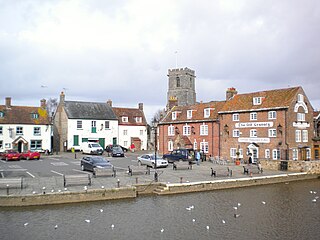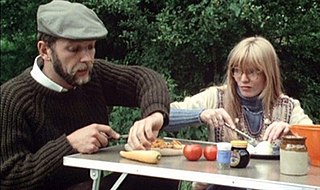
Corfe Castle is a village and civil parish in the English county of Dorset. It is the site of a ruined castle of the same name. The village and castle stand over a gap in the Purbeck Hills on the route between Wareham and Swanage. The village lies in the gap below the castle and is around four miles (6.4 km) south-east of Wareham, and four miles (6.4 km) north-northwest of Swanage. Both the main A351 road from Lytchett Minster to Swanage and the Swanage Railway thread their way through the gap and the village.

Swanage is a coastal town and civil parish in the south east of Dorset, England. It is at the eastern end of the Isle of Purbeck and one of its two towns, approximately 6+1⁄4 miles (10 km) south of Poole and 25 miles (40 km) east of Dorchester. In the 2011 census the civil parish had a population of 9,601. Nearby are Ballard Down and Old Harry Rocks, with Studland Bay and Poole Harbour to the north. Within the parish are Durlston Bay and Durlston Country Park to the south of the town. The parish also includes the areas of Herston, just to the west of the town, and Durlston, just to the south.

The Isle of Purbeck is a peninsula in Dorset, England. It is bordered by water on three sides: the English Channel to the south and east, where steep cliffs fall to the sea; and by the marshy lands of the River Frome and Poole Harbour to the north. Its western boundary is less well defined, with some medieval sources placing it at Flower's Barrow above Worbarrow Bay. John Hutchins, author of The History and Antiquities of the County of Dorset, defined Purbeck's western boundary as the Luckford Lake stream, which runs south from the Frome. According to writer and broadcaster Ralph Wightman, Purbeck "is only an island if you accept the barren heaths between Arish Mell and Wareham as cutting off this corner of Dorset as effectively as the sea." The most southerly point is St Alban's Head.

Wareham is a historic market town and, under the name Wareham Town, a civil parish, in the English county of Dorset. The town is situated on the River Frome eight miles (13 km) southwest of Poole.

Purbeck was a local government district in Dorset, England. The district was named after the Isle of Purbeck, a peninsula that forms a large proportion of the district's area. However, it extended significantly further north and west than the traditional boundary of the Isle of Purbeck which is the River Frome. The district council was based in the town of Wareham, which is itself north of the Frome.

Langton Matravers is a village and civil parish on the Isle of Purbeck, in the county of Dorset in the south of England. It is situated about 2 miles (3.2 km) west of Swanage town centre and 5 miles (8 km) south-east of Corfe Castle. In the 2011 Census the civil parish had 381 households and a population of 853.

The Swanage Railway is a railway branch line from near Wareham, Dorset to Swanage, Dorset, England, opened in 1885 and now operated as a heritage railway.

Dorset is a rural county in south west England. Its archaeology documents much of the history of southern England.

"Nuts in May" is the 12th episode of the sixth season of the British BBC anthology TV series Play for Today. The episode was a television play that was originally broadcast on 13 January 1976. "Nuts in May" was written and directed by Mike Leigh, produced by David Rose, and starred Roger Sloman and Alison Steadman.

Medieval football is a modern term used for a wide variety of the localised informal football games which were invented and played in England during the Middle Ages. Alternative names include folk football, mob football and Shrovetide football. These games may be regarded as the ancestors of modern codes of football, and by comparison with later forms of football, the medieval matches were chaotic and had few rules.

Wareham railway station serves the historic market town of Wareham in Dorset, England. It is situated about 0.6 miles (1 km) north of the town centre. It is 120 miles 70 chains (194.5 km) down the line from ‹See TfM›London Waterloo. On tickets it is printed "Wareham Dorset" to avoid confusion with Ware railway station.

Swanage railway station is a railway station located in Swanage, on the Isle of Purbeck in the English county of Dorset. Originally the terminus of a London and South Western Railway (L&SWR) branch line from Wareham, the line and station were closed by British Rail in 1972. It has since reopened as a station on the Swanage Railway, a heritage railway that currently runs from Norden station just north of Corfe Castle to Swanage station. It now also runs to Wareham on certain services, but not on regular services due to signalling problems.

Corfe Castle railway station is a railway station located in the village of Corfe Castle, in the English county of Dorset. Originally an intermediate station on the London and South Western Railway (L&SWR) branch line from Wareham to Swanage, the line and station were closed by British Rail in 1972. It has since reopened as a station on the Swanage Railway, a heritage railway that runs regularly from Norden station just north of Corfe Castle to Swanage station. The line also connects Wareham and Norden.

The Middlebere Plateway, or Middlebere Tramway, was a horse-drawn plateway on the Isle of Purbeck in the English county of Dorset. One of the first railways in southern England and the first in Dorset, the plateway was built by Benjamin Fayle, who was a wealthy Irish Merchant based in London and a friend of Thomas Byerley - Josiah Wedgwood's nephew. It was intended to take Purbeck Ball Clay from his pits near Corfe Castle to a wharf on Middlebere Creek in Poole Harbour, a distance of some 3.5 miles (5.6 km).

Kingston is a small village on the Isle of Purbeck in the county of Dorset in southern England.

Corfe Castle is a fortification standing above the village of the same name on the Isle of Purbeck peninsula in the English county of Dorset. Built by William the Conqueror, the castle dates to the 11th century and commands a gap in the Purbeck Hills on the route between Wareham and Swanage. The first phase was one of the earliest castles in England to be built at least partly using stone when the majority were built with earth and timber. Corfe Castle underwent major structural changes in the 12th and 13th centuries.
George Bankes was the last of the Cursitor Barons of the Exchequer, the office being abolished by Conservative ministry of the Earl of Derby in 1852. Without any legal experience at the bar, he was the last barrister to be appointed to the post considered to be a medieval anachronism.

Corfe Castle Town Hall is a municipal building in West Street, Corfe Castle, Dorset, England. The town hall, which is currently used as a museum, is a Grade II* listed building.

















